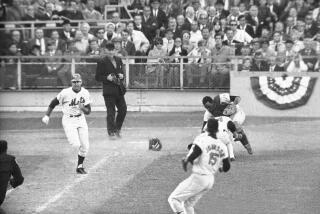BRIGHT LIGHTS, BIG CITY : A Year Later, Dark Fears of Night Baseball All but Forgotten by Wrigleyville Residents
- Share via
CHICAGO — A few yellowing window signs declaring, “No Lights,” can still be seen in windows of vintage apartments near the old ballpark, but most residents around Chicago’s Wrigley Field have found that since the switch was first flipped a year ago today, night baseball has not turned into a neighborhood nightmare.
“Now that we’ve had them for a year, it’s not so bad,” said Patricia Ebright, 37, who owns a house a few blocks west of the ballpark.
Like many of her neighbors, she feared that Cub games under the lights, after 74 years of day-only games, would ruin the largely residential neighborhood, increasing street congestion, noise and vandalism.
Said Alderman Bernard Hanson, as he watched a recent night game: “So far, on a scale of one to 10, it’s been about an 8 1/2.” He said that residents of the neighborhood, called Wrigleyville, are “mostly satisfied.”
Police write $35 tickets to cars without special “resident only” night game parking passes. On the average, 100 cars are towed each game to a nearby church lot. Retrieval costs an additional $105. Most of those cars are not registered in Chicago.
There are no such passes, however, for day games, which means that residents compete with fans for parking. And now, Teofilo Ocasio, a 10-year area resident, doesn’t like day games. “There’s too much trouble parking,” he said.
Yellow T-shirts, which a year ago were worn around the neighborhood as symbols of opposition to bringing the Cubs out of the dark ages, have given way to new paraphernalia--baseball schedules.
Wrigleyville residents carry them in their pockets, stash them in their glove compartments and have them taped on their refrigerator doors so they know when to travel in and out of the crowded neighborhood and when parking will be tight.
Fans, however, have not turned out to be as noisy or disruptive as many had thought they would be. Alcohol is not sold after the seventh inning or beyond 9:20 p.m., whichever comes first. Most of the games are held on work nights so people don’t mill around the streets, as they do after day games. And, the crowd tends to be older.
“I got a chance to work a little later and then come straight over here,” said Butch Marros, a Cub fan for 35 years.
Tom Drake, who changed out of his work clothes in the parking lot, can attend more games.
“Unless you play hooky, it’s hard to come to a day game during the week and it’s hard to get tickets on the weekend,” he said.
Lights did not come easily for Wrigley Field or the Tribune Company, the parent company of the Chicago Tribune and the owner of the Cubs since 1981. The Wrigley family, the previous owner best known for its chewing gum empire, promised day games only. Soon after the team was sold, however, lights for the park became a recurring theme.
For six years, Wrigleyville residents and businesses fought against them. The City Council and the Illinois General Assembly backed the local disapproval with legislation banning night baseball.
But the Tribune ultimately won with a squeeze play, issuing a strong hint that if it did not get lights, Chicago would risk losing the Cubs to a suburban stadium. And organized baseball suggested after the 1984 playoffs, that if the Cubs again qualified for the league playoffs or World Series, because of TV requirements, home games might have to be moved to another park, perhaps in another city.
Night games haven’t hurt business at Guthrie’s Tavern, a small neighborhood pub three blocks from Wrigley Field. Owner Steve Leith hands out city-issued parking passes to non-Wrigleyville customers during night games. He loses business to some regular patrons who choose not to venture out into crowds of 38,000 people.
“But then we get hit when the game’s over so it’s six of one, a half-dozen of the other,” he said.
Sam Toia, previously an outspoken opponent of lights because he feared that his thriving pizza restaurant might lose business, doesn’t have much to complain about. People eat about as much pizza no matter when the game starts.
“Eighteen games are livable for businesses, the community and the Cubs,” he said.
But 18 games are enough, the Wrigleyville residents agree.
Citizens United for Baseball in the Sunshine (CUBS), the neighborhood group that led the fight against lights, now monitors the Tribune Company’s and city officials’ commitment to parking enforcement, cleanup and only 18 regular night games a year.
Official follow-through is likely to lapse “if you don’t squeak loud,” said CUBS president Charlotte Newfeld.
No one will object of course if the Cubs need another night game or two for the playoffs, or, praise be, the World Series. Fans are already excited about next year’s All-Star game, to be played at night.
But in the meantime, “We’re a neighborhood,” Leith said. “. . . That’s the way I want it to be.”
More to Read
Sign up for Essential California
The most important California stories and recommendations in your inbox every morning.
You may occasionally receive promotional content from the Los Angeles Times.









